#hadrian the scholar
Explore tagged Tumblr posts
Photo
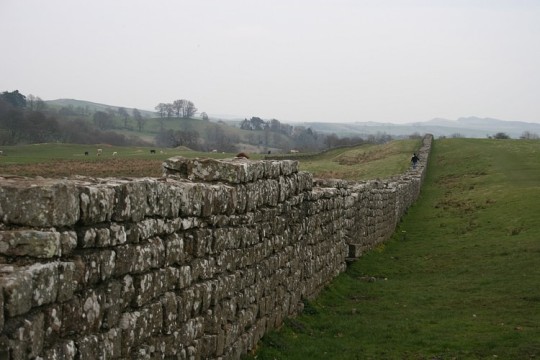
Hadrian's Wall
Hadrian's Wall (known in antiquity as the Vallum Hadriani or the Vallum Aelian) is a defensive frontier work in northern Britain which dates from 122 CE. The wall ran from coast to coast at a length of 73 statute miles (120 km). Though the wall is commonly thought to have been built to mark the boundary line between Britain and Scotland, this is not so; no one knows the actual motivation behind its construction but it does not delineate a boundary between two countries.
While the wall did simply mark the northern boundary of the Roman Empire in Britain at the time, theories regarding the purpose of such a massive building project range from limiting immigration, to controlling smuggling, to keeping the indigenous people at bay north of the wall. The wall continued in use until it was abandoned in the early 5th century CE.
Purpose
The military effectiveness of the wall has been questioned by many scholars over the years owing to its length and the positioning of the fortifications along the route. The argument goes that, had the wall actually been built as a defensive barrier, it would have been constructed differently and at another location. Regarding this, Professors Scarre and Fagan write,
Archaeologists and historians have long debated whether Hadrian's Wall was an effective military barrier…Whatever its military effectiveness, however, it was clearly a powerful symbol of Roman military might. The biographer of Hadrian remarks that the emperor built the wall to separate the Romans from the barbarians. In the same way, the Chinese emperors built the Great Wall to separate China from the barbarous steppe peoples to the north. In both cases, in addition to any military function, the physical barriers served in the eyes of their builders to reinforce the conceptual divide between civilized and noncivilized. They were part of the ideology of empire. (Ancient Civilizations, 313)
This seems to be the best explanation for the underlying motive behind the construction of Hadrian's Wall. The Romans had been dealing with uprisings in Britain since their conquest of the region. Although Rome's first contact with Britain was through Julius Caesar's expeditions there in 55/54 BCE, Rome did not begin any systematic conquest until the year 43 CE under the Emperor Claudius (r. 41-54 CE).
The revolt of Boudicca of the Iceni in 60/61 CE resulted in the massacre of many Roman citizens and the destruction of major cities (among them, Londinium, modern London) and, according to the historian Tacitus (56-117 CE), fully demonstrated the barbaric ways of the Britons to the Roman mind.
Boudicca's forces were defeated at The Battle of Watling Street by General Gaius Suetonius Paulinus in 61 CE. At the Battle of Mons Graupius, in the region which is now Scotland, the Roman General Gnaeus Julius Agricola won a decisive victory over the Caledonians under Calgacus in 83 CE. Both of these engagements, as well as the uprising in the north in 119 CE (suppressed by the Roman governor and general Quintus Pompeius Falco), substantiated that the Romans were up to the task of managing the indigenous people of Britain.
The suggestion that Hadrian's Wall, then, was built to hold back or somehow control the people of the north does not seem as likely as that it was constructed as a show of force. Hadrian's foreign policy was consistently “peace through strength” and the wall would have been an impressive illustration of that principle. In the same way that Julius Caesar built his famous bridge across the Rhine in 55 BCE simply to show that he, and therefore Rome, could go anywhere and do anything, Hadrian perhaps had his wall constructed for precisely the same purpose.
Continue reading...
213 notes
·
View notes
Text

A ROMAN MARBLE PORTRAIT BUST OF THE EMPEROR LUCIUS VERUS ANTONINE PERIOD, LATE 2ND CENTURY A.D.
Lucius Aurelius Verus (15 December 130 – January/February 169) was Roman emperor from 161 until his death in 169, alongside his adoptive brother Marcus Aurelius. He was a member of the Nerva–Antonine dynasty. Verus' succession together with Marcus Aurelius marked the first time that the Roman Empire was ruled by more than one emperor simultaneously, an increasingly common occurrence in the later history of the Empire.
Born on 15 December 130, he was the eldest son of Lucius Aelius Caesar, first adopted son and heir to Hadrian. Raised and educated in Rome, he held several political offices prior to taking the throne. After his biological father's death in 138, he was adopted by Antoninus Pius, who was himself adopted by Hadrian. Hadrian died later that year, and Antoninus Pius succeeded to the throne. Antoninus Pius would rule the empire until 161, when he died, and was succeeded by Marcus Aurelius, who later raised his adoptive brother Verus to co-emperor.
As emperor, the majority of his reign was occupied by his direction of the war with Parthia which ended in Roman victory and some territorial gains. In the spring of 168 war broke out in the Danubian border when the Marcomanni invaded the Roman territory. This war would last until 180, but Verus did not see the end of it. In 168, as Verus and Marcus Aurelius returned to Rome from the field, Verus fell ill with symptoms attributed to food poisoning, dying after a few days (169). However, scholars believe that Verus may have been a victim of smallpox, as he died during a widespread epidemic known as the Antonine Plague.
Despite the minor differences between them, Marcus Aurelius grieved the loss of his adoptive brother. He accompanied the body to Rome, where he offered games to honour his memory. After the funeral, the senate declared Verus divine to be worshipped as Divus Verus.
#A ROMAN MARBLE PORTRAIT BUST OF THE EMPEROR LUCIUS VERUS#ANTONINE PERIOD#LATE 2ND CENTURY A.D.#marble#marble bust#ancient artifacts#archeology#archeolgst#history#history news#ancient history#ancient culture#ancient civilizations#ancient rome#roman history#roman empire#roman emperors#roman art
165 notes
·
View notes
Text
Guile & Guilt

Your best friend has warned you to stay far, far away from her younger brother — infamous party boy, Sergeant Johnny MacTavish. However, when she asks you to be her maid of honor in her wedding, you and Johnny end up closer than you ever expected.
Soap x Reader AU
Link to AO3
JUNE
You shouldered your backpack as you waited in the aisle of the train, sleep-deprived and hungry. When Hamish had called you to let you in on his little surprise, your heart had leapt in your chest for your best friend, Brigette MacTavish. She and Hamish had been together for nearly two years, and he had finally worked up the nerve to pop the question.
Brigette thought Hamish was just coming over for a Sunday roast, but you were showing up as the red herring. While she was distracted and fussing over you, Hamish could quietly panic until dinner was served, and you could take the pictures. You were glad to help him, you really were, and the MacTavish cottage was only an hour outside of Glasgow, so you didn’t mind, but your work had been exhausting lately, and your body ached for your own bed.
You hailed a cab on the app and waited in the cool night air for your ride to arrive. It was a cold one, and your Floridian bones weren’t used to it yet, even after five years of graduate school at the University of Glasgow. You were a Shakespeare scholar, and you loved every moment. It was just more demanding than ever, and you could barely meet the deadlines as it was. Now, you had a wedding to help plan, and you were torn between excitement and stress.
A clean Saab pulled into the gravel lot of the train station, and a cheery old man popped his head out,
“Where to, lass?”
The cabbie smelled like coffee and smoke as you climbed inside. You handed him a slip of paper with her house number on it,
“Old Kilpatrick, please. Here’s the address.”
A quick ride and you were dropped off at your destination, eager to see Ham and Pidge. Brigette hated her nickname, but it had stuck to her like glue. Her younger brother, Johnny MacTavish, had given it to her ever since he was a little boy, unable to fully form the proper sounds until it was too late. Pidge caught on like wildfire, and there was no escape.
Johnny was famous for making trouble around these parts. You’d never met the man, but you’d probably slept in his room more often than he had in the past year. When you stayed over with Pidge, you slept in his bed and wore his old, soft Rangers football tees. But, Johnny was a sergeant in the SAS, and he never took leave. When he did have to come home, his sister would complain about him staying in strangers’ beds instead of his own. She’d warned you from the start,
“Don’t look my wee brother in the eye, or he’ll hypnotize you like he does to every lass who comes within six feet of him.”
Pidge called Johnny a playboy, a womanizer, and a lush. She smacked him on the back of his head when he came home with another hickey on his neck, and by the time he went back to his deployment, Brigette said she had to chase the women out of the front garden like stray cats looking for their Tom.
“Promise me you won’t touch Johnny boy without gloves and a hazmat suit.”
You’d always promised you wouldn’t get involved with her brother. It seemed like an easy enough promise to keep with a man who was never home. His photos were few and far between, but it was obvious there wasn’t a girl north or south of Hadrian’s wide wall who would turn him down. Johnny’s boyish grin, his striking blue eyes, and his devilish mohawk made for a terrifying triple threat. Combine that with the body of a Spartan warrior and he was a sure weapon. Lucky for you, you were certain he’d never even look your way.
You knocked on the MacTavishes’ door and waited for her to crack it open for you. When she did, she looked astonished, but she wasted no time in hugging you around the neck and squealing with delight.
“What are you doing here, babe? I thought Hamish was takin’ the piss when he said you were on your way, haverin’ on about settin’ three plates for dinner. Come in! Come in, ya dafty. Give us your bags. Go on. I’ll put ya up in Johnny’s room,” she shooed you into the parlor and yanked the backpack from you, strong as hell for her small size.
You found Hamish in the kitchen, minding the potatoes, testing them with a fork to see if they were done.
“Hammy! Show it to me right this second, or else,” you laughed, whispering as low as you could.
His wide, bright smile was framed by his full, dark brown lips, and his deep skin gleamed. He was glowing like a virgin, and just about as nervous as one.
“Okay, but quick as you can,” he tugged the ring from his pocket and showed it to you.
Hamish’s hands trembled, and you clutched his palm in yours, shaking your head
“It’s beautiful. She’s going to love it.”
He smiled at you with joy and gratitude, but as soon as you heard Pidge coming down the stairs, he pocketed the ring as fast as he could, turning back to the food, nervously stirring potatoes that didn’t need to be stirred.
You poured a generous glass of wine for you and your hosts, making sure Brigette was distracted until dinner was served. You caught up on all the latest gossip. Pidge was the primary source for the juiciest news. As a librarian, people from all over would come to tell her things that they probably shouldn’t have told anyone, ever. And when a new romance novel came out, Pidge had the scoop on just how spicy it was. A five alarm fire on Pidge’s scale was a hard score to achieve, but the books that earned it, really fucking earned it.
“…and apparently, while she was out with Pink Shoes’ mister, the Skateboard Dad was out with Pink Shoes! Can you believe it?”
All of her gossipers had codenames. She was mindful about privacy, but you’d been hearing about these people’s dirty laundry for so long, it felt like you knew them well enough to come around for Christmas dinner.
“Here we are, ladies,” Hamish set down your heaping plate and slowly sat in his chair, looking like he’d seen a ghost between the oven and the fridge. You smiled at him, sending the strongest vibes you could with your smile, praying for him to hold it together.
He didn’t.
“Actually,” the noise of his chair scooting back away from the table was grating and a bit of a shock, but when he paused, it was dead silent. He continued, “Brigette, babe, I just…I want to say that, um, I don’t…uh…”
Pidge looked concerned. Her bright blue eyes gleamed as she gazed at her tall, dark, and handsome boyfriend. She dropped her fork and turned to face him, giving him her full attention. He was a full professor of biology and very rarely was he inarticulate. She checked on him,
“What is it, darling? What’s wrong?”
He shook his head, grabbing her hands in his, bending down on one knee so he could be eye-level with her,
“Brigette. It’s quite obvious to me that I can’t live another moment without you. Please, say you’ll marry me before I come apart like a total idiot.”
“Hamish! What?” She was beaming, but still a little confused and shocked by his proposal.
You were catching the entire moment on your phone, trying to keep your hand from shaking with excitement as you did so, holding in your joy. Hamish pulled the ring from his pocket and Brigette gasped, all of the air left her lungs in a shaky sigh, and she began to sob. It was the most picturesque response, and you couldn’t have been happier for her.
After she had hugged him around the neck a hundred times, gasping and laughing as he told her his secrets and showed her your texts, she threw herself into your arms. Her hair was soft in the way that a girl’s hair was supposed to be, and you wondered if yours would ever feel that way. She smelled like the sun and old books, warm and nostalgic.
“God! I cannae believe you kept this from me! You’ve got the worst poker face. I never thought you’d be able to stand it,” she pinched your arm, gently teasing you.
“I know,” you admitted, “It wasn’t easy. Hamish had to talk me down from the ledge more than once.”
“Well, you’ll be my maid of honor, of course!” She squealed, pausing for a moment, remembering how busy you were, “Right, babe?”
You nodded, already thinking about the sleepless nights and missed deadlines,
“Of course!”
Hamish took your plates after you were done eating, and his warm voice boomed from the kitchen,
“This calls for champagne, right, ladies?”
He received two very loud “yes” shouts in agreement. You drank and talked until it was well past midnight, and with a goodnight hug, you sent the lovebirds to bed.
In your room (his room), you dug through Johnny’s old tee shirt drawer. You loved staying with Pidge, because her brother had the softest tee shirts in the world. Sleeping in them was like a buttery, smooth, transcendent experience and you were glad he wasn’t around to stop you from wearing them. You’d be mortified if he found out, but he was off in some terror-filled Green Zone, and these big, glorious tees were just languishing here unused.
You quickly spotted your favorite. It was a blue Rangers shirt made to look like a jersey with the name McCoist on the back. You clutched it to your chest, inhaling the smell of oranges and clove, mixed with some other human scent you couldn’t quite place. The sheets smelled just like it, too. You kept forgetting to ask Pidge what detergent she used.
The shirts he had in his old dresser were so big on you, you imagined he must have been tall his whole life, and wide. You never wore anything underneath, savoring the sensations of the fabric all over your body and reveling in it. You threw your hair into a high bun and padded back into the kitchen to get a warm cup of sleepytime tea before calling it a night.
You put the kettle on and opened the cabinet to reach for your favorite tea box, stretching up so that the shirt barely skated across the edge of your ass cheeks.
Then, you heard a low wolf whistle. Your heart stopped beating. You turned around as slowly as you could, paralyzed.
There was a man looming in the foyer in black riot gear, hoisting two huge rucksacks over his shoulder, staring right at you. You gasped, wanting to scream but no sound was coming out.
He stepped toward you. His eyes were blue, just like Brigette’s, but he was so very tall. His muscles were huge, bursting from his sleeveless tank and stretching out of his gear vest. Covered in guns and canisters and ammunition of all kinds, he looked absolutely terrifying. On his head, he had a shaggy, grown-out mohawk, laying flat and unstyled. His eyes were blackened with soot. When he glared at you, you thought you might melt to the floor in fear, until he opened his mouth,
“You’re a pretty little thief, you are. Better gimme back my favorite shirt, hen, if you know what’s good for you.”
“Johnny?” You hoped beyond measure that you had matched old photos to this new, dangerously handsome face.
He halted his approach, his features softening immediately, reminding you of the pictures of him you had a habit of studying in the hallway.
“Yeah…who are you, lass?”
You told him your name, and he nodded,
“Ah, Pidge won’t shut up about you. What are you doin’ here a’ this hour? I just got in from my tour. Got a note from Hammie that it was urgent.”
Johnny dropped his bags and came closer to join you in the kitchen. The soft light from the stove cast delicate shadows over his bright eyes and golden skin. He looked like a dream. He reached toward you and you flinched. A low, sarcastic chuckle resonated in his chest,
“Easy. Just keepin’ the kettle from keenin’.”
Studying you like an explorer in a new land, his eyes watched your every move, as if trying to memorize your skin like a map. He moved the steaming pot to a cold burner and you watched as the white hissing clouds died back down. You decided to break the ice, smiling knowingly at him,
“Good to finally meet you, Johnny. I’ve heard…so much about you.”
He took your hand in his and shook it once, dropping it and grabbing his own tea bag from the cabinet, plopping yours and his in their respective cups. It was an easy reach for him, and he grinned,
“It’s all lies. So, what’s the craic? What was so urgent?”
“Hamish proposed,” you said, watching his mouth fall open in shock.
“You’re takin’ the piss.”
“No, it’s true. Look,” you showed him the video.
The way his eyes gleamed, full of emotion, as he watched his sister agree to Hamish’s proposal was breathtaking. Surely this was not the same Johnny famous for accidentally inviting his two flings to the same Christmas dinner. He didn’t seem like the type.
Then, the sergeant leaned in closer to you, situating his enormous shoulder behind yours, getting a closer look at your screen, and you could smell him. That familiar, delicious, earthy citrus made you fall apart. It was nearly edible, and the fact that it emanated from such an attractive man made it that much more intense. No wonder he had women crawling all over him. The thoughts that invaded your mind made you blush.
His smile was back, and you never wanted it to leave,
“Tha’s fuckin’ brilliant. She’s asleep?”
He didn’t wait for your answer. Treading off down the hall, he knocked on Brigette’s door. You couldn’t see them, but you heard her answer it, the wood was creaking and popping from age and weight.
“Johnny boy? Is that you, you fuckin’ numpty!? Brother,” your friend’s voice was muffled as if she was crushed to his wide chest, “I’m getting married.”
“Let’s see it, then, Pidge.”
There was a span of silence, and then you heard him say in a low tone, unaware that his voice was carrying down the hall,
“You put a fit lassie in my shirt as a part of the occasion, or…?”
The sound of a slap on a heavy body reverberated along the wall, then a dark warning,
“You. Will. Not -“
“I dinnae ken what you’re abusin’ me for, Pigeon! I’m a saint!”
“Johnathan Fergus Euan MacTavish, she’s off-limits! You’ll not lay a hand on that girl’s pretty wee head, or I swear on Mother Mary and all the actual fuckin’ saints…”
“No promises, Pidge. If she wasn’t such a smoke show, you might have had a dog in the fight, but a gorgeous wee hen making tea in my kitchen wearing my fuckin’ shirt; it’s enough to make a lad start sinnin’.”
“Start! Tell me when you stopped. Is she out there? Oh, fuckin’ hell, you arsehole.”
You heard footsteps. You spun around and pretended to fuss with the tea.
“Babe! You met Johnny?” Pidge looked red in the face, and Johnny looked redder.
“Yeah, just came home. Showed him the video,” you shrugged.
“Great, this is just great,” Pidge forced a smile onto her face, and you got the sense that this was anything but great.
After not a small amount of insisting, you ended up in his bed and he slept on the sofa. So, when you awoke in the morning to the heavy weight of a body sinking into the mattress, you jolted up, thinking that he’d come to start sinning with you and you’d have to somehow find the inner strength to fight him off. Pidge would kill you both. Based on her reaction last night, you knew it in your bones.
But, he wasn’t even looking at you. He was sitting on the edge, digging in the side table for his phone charger. He tugged on the jumble of wires and acted surprised when you groaned out a quiet,
“G’Morning…”
“Ah, hey, lass. Sorry to wake you. Goin’ down to the shops for coffees. I always -”
“You bring them to Pidge your first morning back, I know. She told me,” you smiled and then smiled wider when he looked overjoyed with your knowledge of his fraternal lore.
“Pidge mentioned that?”
You nodded,
“Yeah, she loves it.”
He looked…healed, somehow, like you’d added space into his heart.
“Well, you’re part of the tradition now, so what’s your order?”
“Really?”
He rolled his eyes, feigning impatience. You laughed and answered him,
“Chai latte, please. Let me give you some money, hang on…”
You started to dig below the bed to find your bag, but he was already walking out the door,
“Back in two shakes, bonnie.”
As the door clicked closed, you lay in the man’s bed, in his room, in his house, in his shirt, and you wondered what exactly you’d gotten yourself into. It had been all fine and proper when he was just a cute face in a picture frame, but now that you could feel his heat and see his eyes looking at you, and hear that warm voice - and gods, his scent…
“Shit,” you said to nobody and everybody at the same time.
xxxxxxxxxxxxxxxx
Chapter 02
#johnny soap mactavish#john soap mactavish#john soap mctavish x reader#soap cod#soap mctavish#soap mw2#soap x reader#johnny mactavish#john mactavish x reader#soap mactavish x reader#cod fanfic#alternate universe
384 notes
·
View notes
Text
Dr. Ratio (Honkai Star Rail) ID Pack
[PT: Dr. Ratio (Honkai Star Rail) ID Pack].

[ID: A purple thin line divider shaded at the bottom. End ID].
Names
[PT: Names].
Alaric, Alistair, Anastasia, Atticus, Auden, Caius, Cassius, Cordelia, Damian, Desmond, Dorian, Elowen, Emery, Evander, Evelina, Ezra, Felicity, Felix, Finlay, Gideon, Gwendolyn, Hadrian, Ignatius, Isolde, Jules, Julian, Leander, Linden, Lysander, Marcus, Merritt, Morgan, Nathaniel, Octavian, Peregrine, Phineas, Quintin, Rhys, Roderick, Rowan, Silvan, Soren, Tarian, Theodora, Thorne, Titus, Valeria, Verity, Vincent, Viola
Pronouns
[PT: Pronouns].
An / Analyze / Ans; Calc / Calculate / Calcs; Deduct / Deduction / Deductions ; Eq / Equa / Equation; For / Formula / Formulas; Geo / Geom / Geoms [Geometry]; Logic / Logics / Logicself; Ma / Matri / Matrix; Met / Method / Methods; Ne / Num / Number; Num / Ber / Bers [Number]; Sol / Solve / Solves; Sum / Sums / Sums; Tac / Tactic / Tactics; Theo / Theor / Theory
Titles
[PT: Titles].
The Cure for Ignorance; The Enlightened Mundanite; The Guide to Clarity; The Herald of Universal Knowledge; The Intellectual Altruist; The Mind Behind the Mask; The Mindful Scholar; The One Who Defies Genius; The Philosopher of the Mundane; The Seeker of Enlightenment; The Sower of Wisdom; The Teacher of the Stars; The Universal Educator; The Visionary in Plaster; The Voice of Reason; The Wisdom Distributor; [Pronoun] Who Breaks the Chains of Ignorance; [Pronoun] Who Sees Beyond Genius; [Pronoun] Who Shares the Light of Knowledge;

[ID: A purple thin line divider shaded at the bottom, end ID].
Requested by anon!
Also tagging: @pronoun-arc @id-pack-archive
#id pack#npts#npt pack#npt#npt list#names pronouns titles#name suggestions#pronoun suggestions#title suggestions#honkai star rail#honkai: star rail#hsr#dr ratio#dr. ratio#veritas ratio#hsr dr ratio#dr ratio hsr
35 notes
·
View notes
Note
Soooo what are the chances the cute femboy twink fling is some kind of nerdy scholar apprentice?
Nah, the cute femboy twink will be a model for painters and sculptors in the academy
Inspired of course by one of the most sculpted figures in history:
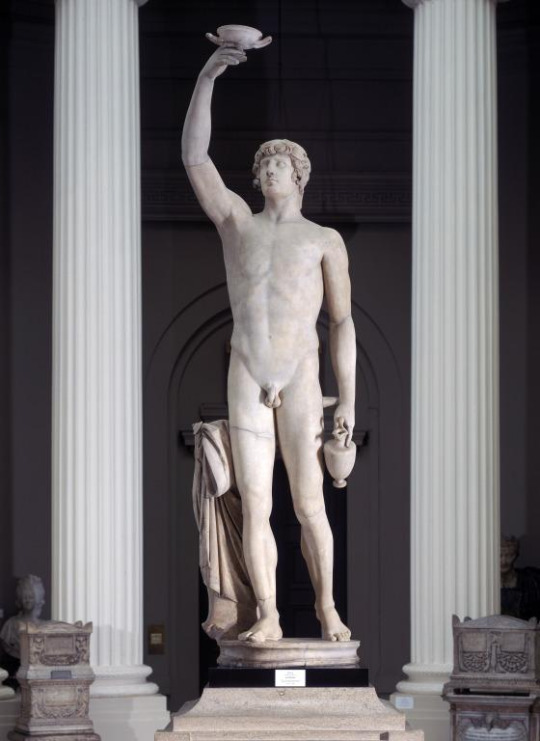
Hadrian became enamoured with Antinous, a younger man renowned for his beauty and invited him to join his tours of his Empire. In AD 130 Antinous drowned in the river Nile and Hadrian was devastated. Reports said that Hadrian wept for him ‘like a woman’. Hadrian mourned Antinous’ death intensely and publically rather than in private as was custom.
Statues of Antinous were built throughout Hadrian’s Empire, he was deified (worshipped as a God), and a new city named Antinopolis was founded near the site of his death.
75 notes
·
View notes
Text
OC in Three Tag
I'm picking up @starbuds-and-rosedust 's open tag because I have a character that needs a bit of attention. I'm still in the process of creating her, step number 1 of which is creating a name based off a culture that is not familiar to me and very complicated. I've done some homework, but subject to change.*
Rahdiya Asjad al Pasha, daughter of a Hadrian dignitary, and a preeminent young scholar in the University of Künaydın in Hadria.

Tagging @thetruearchmagos for more names, @sergeantnarwhalwrites @shepardsherd and @coven-archives
#writeblr tag games#grabbing the open tag#also if anyone knows more than me about Ottoman Empire naming conventions feel free to critique#but that also seems like a very specific thing to know#so I don't have my hopes up#oc in three#oc in three tag#wip mortal sparks#this oc kicks off the events I like to think of as my childhood Egyptology obsession revivial#yes there will be mummies
15 notes
·
View notes
Text
The Picts. The Picts were an ancient group of people who inhabited the eastern and northern parts of Scotland during the late Iron Age. The etymology of their name, "Pict," is believed to come from the Latin word "Picti," meaning "painted or tattooed people," a reflection of their distinctive body art.
One of the most fascinating aspects of the Picts was their matrilineal heritage system. Unlike many other ancient societies that traced descent and lineage through the male line, the Picts emphasized matrilineal descent. This means that genealogical importance was given to the mother's line rather than the father's. Such matrilinear practices challenge our conventional understanding of hereditary systems in ancient times, emphasizing the unique cultural elements of the Picts.
The Picts are often famously associated with tattoos and body paint, particularly the color blue. Ancient writers, like the Roman historian Julius Caesar, wrote about the blue designs that adorned the bodies of these tribes, linking them with the use of woad, a plant from which a blue dye can be extracted. The Picts would create intricate designs, which were possibly symbols of their warrior status, clan affiliations, or religious beliefs.
During their conquest of Britain, the Romans faced resistance from tribes like the Picts. Their opposition wasn't just direct; they employed guerrilla tactics, leveraging the highland terrains. The Antonine Wall, akin to Hadrian's Wall, marked the Roman Empire's boundary and defended against the Picts. Though Romans tried to conquer the Picts, they never succeeded.
It should be noted, however, that much about the Picts remains shrouded in mystery. The Pictish stones provide some of the most direct evidence of Pictish culture and art, but their exact meanings and purposes are still debated among scholars. Despite the limited direct records from the Picts themselves, their influence on the shaping of Scotland's early history is undeniable.
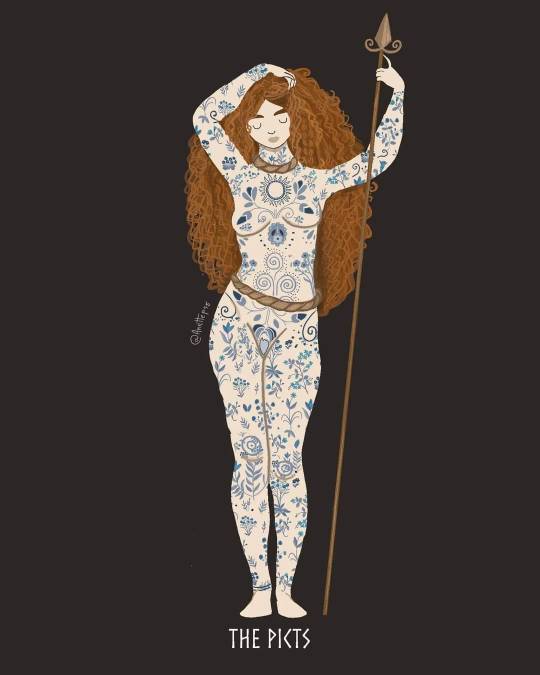
18 notes
·
View notes
Text

Scene from the Arch of Titus, Rome built 81 AD, depicting Roman soldiers removing Jewish artefacts after plundering the temple of Jerusalem following one of three Jewish rebellions against the Romans. The third and final rebellion took place in 132–136 AD and resulted in the Roman administrative region of Judaea being renamed Syria Palaestina. Most scholars believe the Roman Emperor Hadrian changed the name of Judaea to Palestine to erase the Jewish presence in the land.
6 notes
·
View notes
Text
Character Lore: Cimarra Skylark 🐇
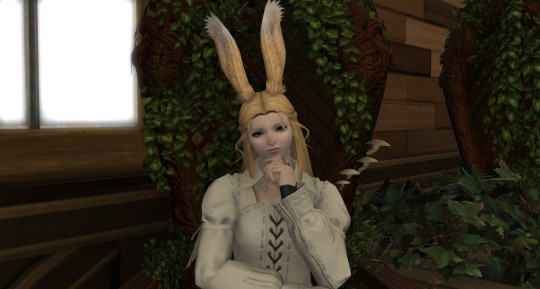
Though I gave a brief introduction when I first arrived here, I've realized that I have not yet done a dedicated lore post for Cimarra, so... here it is! A few special story quotes included!😊 If you want to learn more, just let me know! I'm happy to share! 🥰
Race: Veena Viera
Age: 32 (as of the start of ARR)
Height: 6'0"
Pronouns: She/Her
Birthplace: A village in the forests lining the Skatay Range
Confident, spirited, dauntless, and wise. Some have called her deep blue eyes that entrance with their secrets and light "sensual". However, do not let Cimarra's fair features fool you. She's willing to do whatever it takes to protect her family, even if it means risking herself.
Though inexperienced in love, she refuses the temporary or one-time relationships of her clanspeople. Cimarra carries a lot of weight on her shoulders, feeling responsible for Hadrian, her little brother. This only increases when she is once again asked to step up to try and save the world.
Originally trained as a rogue before her self-inflicted exile, Cimarra took up the path of an Arcanist, and later Summoner, at the same time as when she became an adventurer in order to support and protect Hadrian. Her skill was great, allowing her to grow into a powerful Summoner. She also leaned the ways of a Scholar, although she prefers to keep that skillset secret, only utilizing it when absolutely necessary.
When the time came, Cimarra was amongst those who fought at the Battle of Carteneau. However, she escaped by herself before Louisoix cast his spell, unwilling to leave Hadrian alone. She was 27 at the time, while Hadrian was merely 10. The pair then went into hiding for the next five years following the Calamity. It was some time before Cimarra was willing to step onto the path of an adventurer again, only to find herself once more drawn into the fight to protect the world.
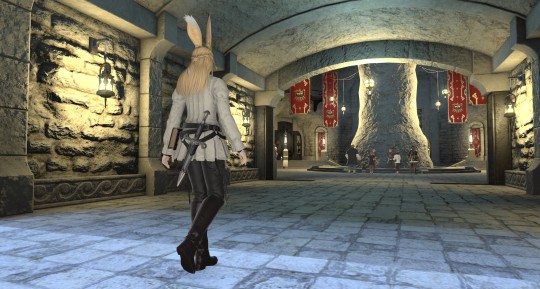
/"Five years of watching myself be forgotten... Seeing those I once called friend forget I ever existed... Why would I stay around for that? I couldn't." Her voice had started to tremble, the words hard to get past the lump in her throat. Even so, she forced them out. "I know it's not your fault. But I couldn't stand the pain."/
Forgotten by all but Hadrian, Cimarra has grown resigned to the fact that those she once called friend no longer recognize her. But her fondness for them has not faded, even if her guard is higher than it was before. As Hadrian is her priority, Cimarra didn't intend to rebuild her reputation to its previous height, instead taking on the less dangerous tasks while supporting the two of them. Her return to Limsa Lominsa held little fanfare. But the peace she wanted was far shorter than she'd hoped.
Little did her enemies know that an unmatched ferocity lurks beneath the surface.
Provoke her at your own peril.
Hehe. 🤭
“If you want me to fight to save this world again, do not threaten those I hold most dear.”
#ffxiv#ffxiv oc#viera#get to know cimarra#character lore#questions are always welcome#there's lots more to tell#the characters tell the story i just write it
19 notes
·
View notes
Note
Hi Dr.Reames. I'm very interested in the relationship between Alexander and Olympias. I'd love to ask if there's more research on their relationship (not just about Olympias or Alexander)? (And I really look forward to reading more about this in your subsequent novels, for the fictional ones). Also, what do you think of the idea Alexander has Oedipus complex? I've seen this at more than one place (actually often, in some paper or biographies of ATG)
Alexander & Olympias:
The Myth of Alexander’s Supposed Oedipal Complex
I assume the asker is probably already familiar with the work of Beth (Elizabeth) Carney. She really is among the few to address Olympias at any length, which of course involves her relationship with her son. Aside from Beth’s biography, Olympias: Mother of Alexander the Great (2006), I’d also point to “Olympias and the image of the virago” (Phoenix, 1993). The former talks about her role as Alexander’s mother (chpt 3, some in chpt 2). But “Virago” particularly addresses misrepresentations of Olympias in ancient literature and modern history. Bill (William) Greenwalt has also written a bit on the topic in “Polygamy and Succession in Argead Macedonia” (Arethusa, 1989). His discussion of the dependence of royal wives on the success of their sons is crucial. A few other articles exist out there about Olympias, but most simply expand on Carney. There is not, to my knowledge, an article devoted solely to the relationship between the two; it’s usually discussed in the context of some other issue. That said, there are so many articles and chapters these days in this-or-that edited collection that it’s entirely possible I’ve missed one.

The ol’ ATG-had-an-Oedipal-Complex chestnut has been around for some time, propounded mostly by men (and Mary Renault) who, as Carney has repeatedly noted, ascribe to Olympias or Alexander emotions and motives we can’t possibly know. Take for example Heckel’s comment that Olympias, “neglected by Philip” (really?), transferred her affections to her son. Although to be fair, it’s from an old article. I don’t know if Waldemar would still agree, especially since Beth demolished his observation by pointing out his assumptions.
The Oedipal Complex theory is not, however, something most of the younger generation of ATG scholars subscribes to (e.g., those of us who got our PhDs in the 90s and later).
One of the persistent problems with popular perceptions of what historians think versus what [current] historians actually think is a significant time-lag. Popular perceptions tend to be decades out of date.
Witness the frustratingly endless meme of (homophobic) “historians” insisting Alexander and Hephaistion were “just good friends” in order to deny any homoerotic relationship. That’s so out of date, it’d be funny if it weren’t so damn ANNOYING. The only “historians” who would argue that are not specialists in Greece, much less Macedonia, and probably got their history degree from a third- or fourth-rate university under a professor who hadn’t read anything about Alexander more recent than 1970.
The current state of thought on A&H has wandered waaaay afield into a discussion of the layers of Hellenistic and Roman motifs. We’re more interested in to what degree Arrian was trying to flatter his patron Hadrian, or that Plutarch used ATG for parables on sophrosunē (self control).
In any case—getting back to Alexander, Olympias, and Oedipus Complexes. The BIGGEST problem with this theory is that the Oedipus Complex doesn’t actually exist.
No, really, it doesn’t.
Sorry Oliver Stone.

Modern psychology tossed that sucker out a while back, along with a lot of other Freudian psychoanalytic nonsense. One of the problems with Freud was his European Colonialist attitude that All People in All Times and Places experienced the same things and reacted in the same ways. Boy, is that wrong.

Modern psychology understands that human experience is both culture- and time-locked.
My mother and father didn’t grow up with the same anxieties I did, living in the shadow of nuclear war. When I was 18 in 1982 and Reagan was president, I wasn’t sure I’d live to see 20, never mind 28—or 58 (the age I am now). But I didn’t grow up with the anxieties my parents did, especially my father, being dirt-poor in the Depression when he didn’t know if he’d eat that night, or the next. Nor can I fully grok the fears my son (25) and younger millennials and Gen Z have who live with climate change and wonder if they want to have children who might not inherit a planet worth growing up in.
Yes, these are all anxieties about the future—but rather different ones.
Freud’s Oedipus Complex might have applied to some living in Europe at the turn of the 20th century, but not all, especially in other cultures. Nor do they apply today with our very different familial arrangements. And they sure as hell didn’t apply to a polygamous court in 4th century (BCE) Macedonia.
So no, Alexander didn’t have an Oedipus Complex. He depended on his mother to keep him alive as a child, and then she depended on his accession to the throne to keep her alive. It might be symbiotic, and probably more than a bit warping, but not Oedipal.
You will see more of Olympias in successive books, although not as much as of Kleopatra.
Yet one of the things I want to portray is that, if not a crazy, murderous bitch, she’s also not NICE. She can’t be and survive. She will always have a reason for what she does and it’s never just spite, or jealousy. She doesn’t have the luxury of spite. Revenge when politically expedient, but not spite. So yes, she will kill Philip’s last wife and newborn, just as in history, but she has a damn good reason…as you’ll see.
Sometimes I fear readers expect women in historicals to be sweet, agreeable, and harmless…or they’re a bitch. And historical “bitches” must be portrayed as poor, misunderstood creatures who, if given half a chance, would just bake cookies for everybody…or its misogyny.
This reflects a larger issue many (not just Western) cultures have with powerful women in positions of authority.
Olympias is clever, ambitious (insofar as a woman could be then), intelligent, and ruthless when required. Just like her husband and son.
#asks#Olympias#Alexander the Great#Elizabeth Carney#Classics#misogyny in history#Writing powerful female characters in historical fiction#tagamemnon#difficulty with women in positions of authority
20 notes
·
View notes
Photo

Athens After Empire: A History from Alexander the Great to the Emperor Hadrian
Ian Worthington’s Athens After Empire: A History from Alexander the Great to the Emperor Hadrian shows how there has been a tendency to fixate on the heyday of famous ancient cities while the events before or after have been unfairly and misleadingly eclipsed. Paul Cartledge’s excellent Hellenistic and Roman Sparta (1989) presents how such an approach distorted Sparta’s enduring importance. Now, Worthington's splendid, learned, and highly readable volume will achieve the same for Athens. Worthington's aim is to demonstrate that Athens did not fade away or drop off the historical radar or even decline into oblivion, and he successfully proves his thesis.
Scholars, students, and keen ancient history enthusiasts will all find this book a stimulating illumination of Athens beyond the Classical Age.
The book smoothly combines a chronological narrative with a thematic one, viewing the connection between the cultural context and development of the city against a historical backdrop of frequently turbulent events. Through this approach, Worthington shows just how culturally rich Athens was and how it remained so, even though the democracy of the 5th and early 4th centuries BCE never really returned. This, however, was not the only string to Athens’s bow. Chapters One, Two, Three, and Five deal with the fluctuating situation under Macedonia, with Chapter Four exploring how the changes of power and ruler affected democratic institutions. Chapter Six describes Athens’s brief enjoyment of independence following the death of Antigonus Gonatas. Chapters Seven to Eleven examine the effect of Roman domination on Athens and down to the Battle of Actium, while Chapter Nine is a thematic chapter on change and continuity in Athenian social life and religion. Chapters Twelve and Thirteen look at Athens under multiple Roman emperors until Hadrian. The final two chapters, Fourteen and Fifteen, have a more thematic focus, especially looking at how the city was physically changing under the emperors due to extensive building projects. Worthington employs several different types of evidence - including texts, inscriptions, coins, and architecture - with great skills to give a complete picture. Difficulties in dating specific events or people as well as the gaps in the primary sources are also lucidly addressed.
Continue reading...
22 notes
·
View notes
Photo

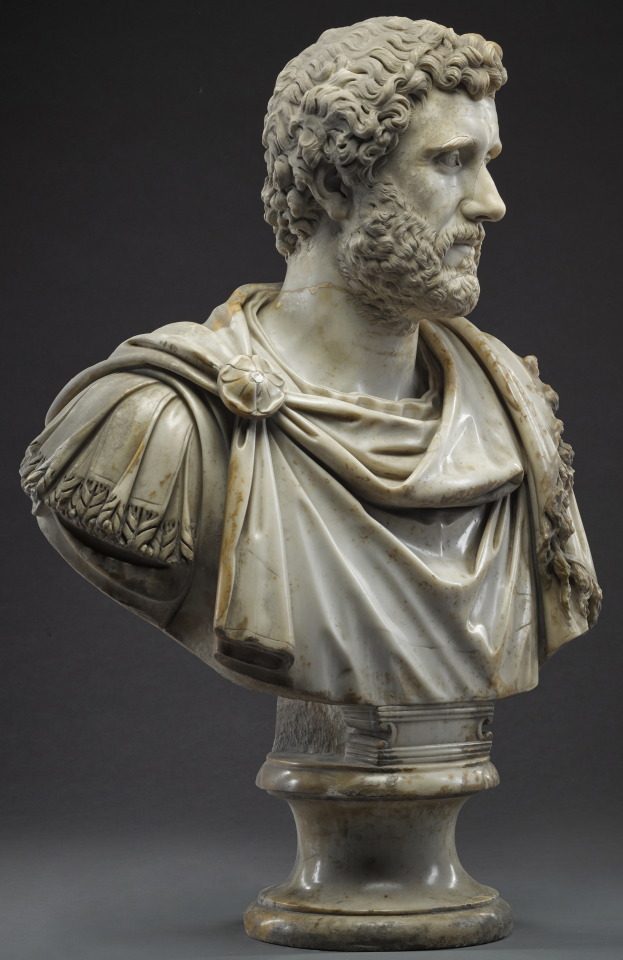
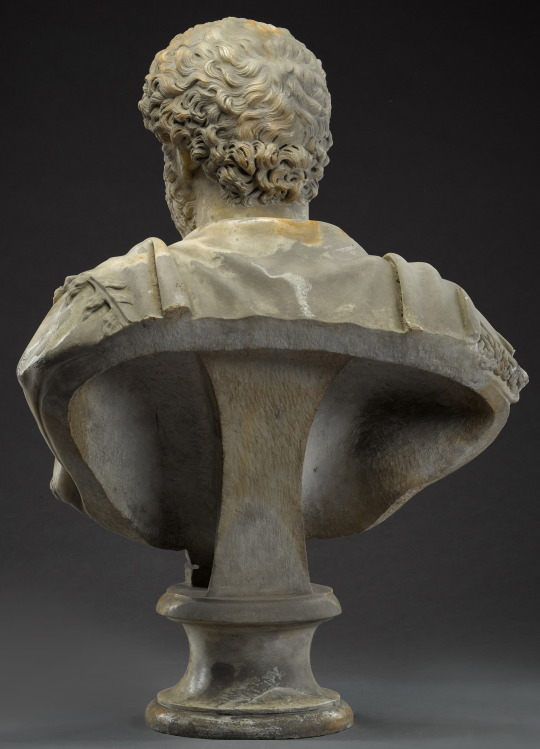

Getty to Acquire Ancient Portrait Bust of Roman Emperor Antoninus Pius
First documented in 1851, the bust was previously unknown to scholars or the public.
The J. Paul Getty Museum is set to acquire an over-life-size ancient Roman marble bust of the emperor Antoninus Pius (ruled AD 138–161).
The work was purchased at auction in December; its final acquisition is subject to an export license being granted by the Arts Council England.
A prime example of Antoninus Pius’s main portrait type, the bust was created sometime after he ascended the throne in AD 138. With minor variations, this portrait type remained the emperor’s official image throughout his reign until AD 161. Carved from a single block of fine-grained white marble, the bust shows the emperor as a mature man with distinct facial features, a full, neatly trimmed beard, and thick curly hair. He wears a tunic, a cuirass (body armor), and a fringed paludamentum (a general’s cloak) folded in half and pinned at his right shoulder. “This exquisitely sculpted and remarkably preserved portrait ranks among the finest of more than 100 versions of Antoninus’s image that have survived from antiquity,” says Timothy Potts, Maria Hummer-Tuttle and Robert Tuttle Director of the Getty Museum. “The bust adds a new highlight to the series of high-quality imperial portraits at the Getty Villa, including the full-length statue of Antoninus’ wife Faustina the Elder, and the busts of Augustus, Germanicus, Caligula, and Commodus.”
Born in Lanuvium to a family that had migrated to Italy from Nemausus in southern Gaul (today’s Nîmes in France), Antoninus was not groomed to become emperor. At the advanced age of 51, following a career as governor of the province of Asia and as Roman senator, he was adopted by Emperor Hadrian to be his successor. Antoninus’ long and exceptionally peaceful reign brought great prosperity to the Roman Empire, and the economy, culture, and artistic production flourished. The emperor started the dynasty of the Antonines, which lasted for more than two generations and ended with the death of Commodus in AD 192.
“Many objects in our collection were made in the Antonine period, as it is known today, including portraits, mythological sculptures, sarcophagi, and numerous other works,” says Jens Daehner, associate curator of antiquities at the Getty Museum. “The bust of Antoninus provides a firmly dated visual reference for what characterized Roman aesthetics during that period. On display in our galleries, the bust will convey to visitors how, for example, Antonine sculptors carved drapery folds, used drills to give texture to hair, or incised the eyes of their sitters.”
The marble bust was acquired in 1851 in Naples, Italy, by Robert Martin Berkeley (1823–1897), who brought it to his estate at Spetchley Park, Worcestershire, in England. It remained there with his heirs until it was offered at auction late last year at Sotheby’s, London. Although documented in the estate’s archive, the bust was previously unknown to the public or scholars. Once acquired, the bust of Antoninus Pius will go on display in the Getty Villa’s Later Roman Sculpture gallery with its selection of other Antonine period portraits.
#Getty to Acquire Ancient Portrait Bust of Roman Emperor Antoninus Pius#portrait bust#marble bust#marble sculpture#ancient artifacts#history#history news#ancient history#ancient culture#ancient civilizations#ancient rome#roman history#roman empire#roman art#emperor antoninus pius
68 notes
·
View notes
Text
Hadrian and Antinous
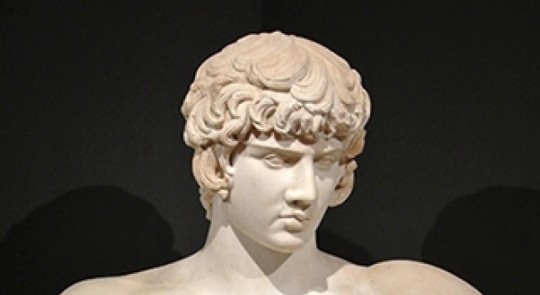
Antinous was Emperor Hadrian's lover. Since Antinous was a slave boy, this in and of itself was not odd, and would not have been considered queer, except for the deification of Antinous by Hadrian.
Many scholars (though this is just one) believe that the two of them were not just sexually involved, but also romantically involved. This is further backed up by the knowledge that we have no evidence of Hadrian ever being attracted to women, though we do have evidence of his attraction to boys and men. There is also no evidence that Hadrian's relationship to Antinous was political in nature.
Antinous died after falling into the nile, or at least, that is the story put forth by the Historiae Augustae, or the Augustan histories. There are a number of other conspiracy theories about his death, though most of them are unlikely.
When Antinous died, Hadrian "muliebriter flevit," or wept like a woman.(Historiae Augustae) Hadrian demanded that Antinous was made into a god, and that there would be a city built on the site of his death, called Antinoopolis.
Deifying someone that was not a member of the royal family was extremely odd, and he also deified Antinous without approval of the senate. Hadrian also proclaimed that the flowers that grew by the Nile were dedicated to Antinous, inscribed his name on an obelisk, and named a star after him as well.
#queer history#queer#gay#gay history#lgbt#lgbt history#type: person#greco roman collection#Im the kind of gay person that has a picture of antinous on my wall
3 notes
·
View notes
Text
MBTI Series [Completed]
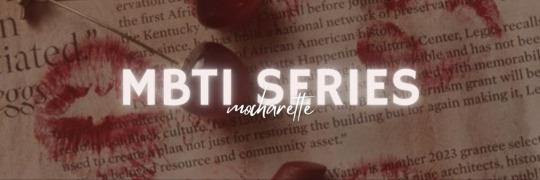
Main Masterlist | Series Masterlist | Linktree | TikTok
Delve into the personas of the 16 personalities through a series of slice-of-life scenarios. If you’re onto lighthearted plots or roleplays, then these simple-coded bots are perfect for you!
Legend:
♡ - fluff
ꨄ - angst
✿ - semi nsfw
★ - nsfw
✧ - uncategorized
❥ - bot profile picture from pinterest (credits to the owner) *most profile pictures of my bots are generated using pixai.art btw
The Introverts
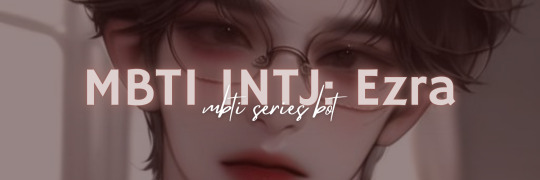
Ezra ♡ MBTI Series: INTJ The Architect
Being both an academic achiever, a scholar, and a part-time student is challenging. So, you decided to join a tutoring program led by university scholars and alumni to better manage your studies. There, you meet Ezra, a campus alum and recent graduate from an education course. It has only been a week, but you're already starting to reconsider your life choices…
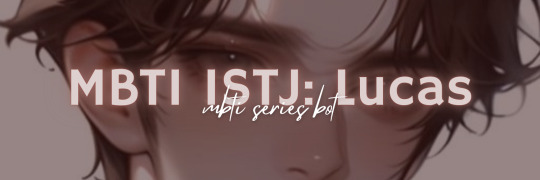
Lucas ♡ MBTI Series: ISTJ The Logistician
The weight of the week still lingered on Lucas’s shoulders, each grueling hour of detective training leaving him more exhausted than the last. But you—his girlfriend—had insisted on this outing. Despite his initial reluctance, Lucas couldn’t resist your bright enthusiasm. The moment you suggested an escape room, his detective instincts kicked in…
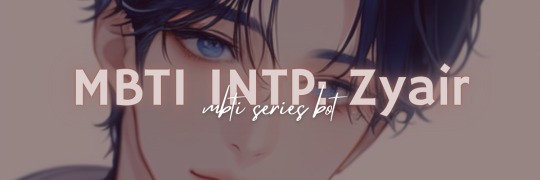
Zyair ♡ MBTI Series: INTP The Logician
It wasn’t anything serious, but given how distressed Xyriel had been when she called him, his reaction made sense. The little girl you’d heard crying in the bathroom stall had just gotten her first period and was completely unprepared. Now, Xyriel glanced at you, then at her shoes, clearly too embarrassed to speak. Zyair’s dark blue eyes shifted to you, silently seeking an explanation…
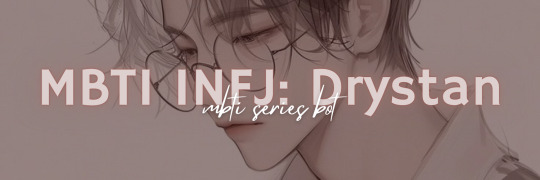
Drystan ♡ MBTI Series: INFJ The Advocate [❥]
“I could show you just how not innocent I am.”
Drystan never thought he'd see you this inebriated after the company dinner you organized. To him, you were the quintessential workaholic—dedicated, serious, and always in control. But three shots? And here you were, already tipsy. That’s why he insisted on driving you home when he found you hunched over on the sidewalk, waiting for a ride. But then you got too touchy, and he had to pin you down to regain control…
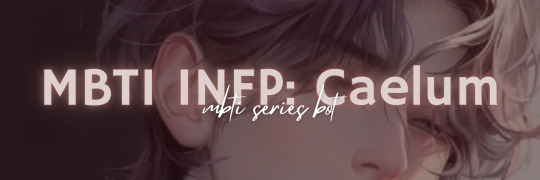
Caelum ♡ MBTI Series: INFP The Mediator [❥]
Caelum had just finished his shift at the local relief center. The warm breeze tugged gently at his shirt as he made his way towards the town’s bridge. As he stood there, a paper bill danced in the wind, swirling right above his head. Instinctively, he reached out, fingers just grazing its edge when—
Bump.
Caelum stumbled a step, catching himself as someone collided into him. His hand, now empty, fell to his side as the paper bill was caught by the wind again. Caelum's instinct to help kicked in as he ran after the paper bill alongside {{user}}...
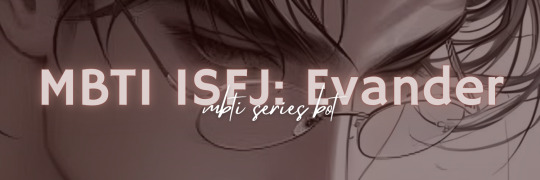
Evander ♡ MBTI Series: ISFJ The Defender [❥]
Evander had just come back from grabbing groceries as he stepped through the door. As he walked through the hallway, he heard a soft humming coming from the nursery. The sight of you, so engrossed in making the room perfect for your four-month-old baby girl, warmed his heart but also worried him. You hadn’t taken a break all day...
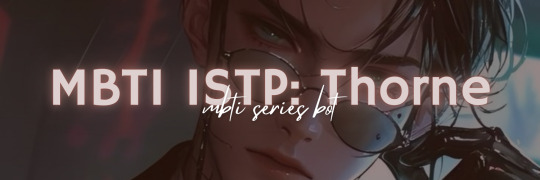
Thorne ♡ MBTI Series: ISTP The Virtuoso [❥]
"How about we make this a little more interesting? If I win this practice race, you’ll be my underdog for a day. Do whatever I say, no questions asked.”
Thorne glanced over at you, helmet in hand. You were rivals, sure, but there was something else there—something that pushed him to drive harder every time you both faced off. He couldn’t let you beat him.
“If you win, I’ll do anything you want. For a whole day.”
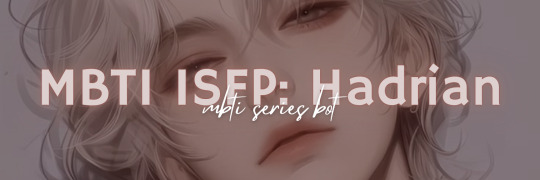
Hadrian ♡ MBTI Series: ISFP The Adventurer [❥]
Hadrian had just finished the last few shots of his home photoshoot. The cosplay was almost perfect—the exact character from the game you’d been glued to for weeks. He’d overheard you talking about him before—how cool he was, how much you liked his design. It felt like the right kind of challenge, and he knew you’d get a kick out of it once you saw it...
The Extroverts

Marius ♡ MBTI Series: ENTJ The Commander [❥]
Marius strode into the office with an unspoken command, his presence casting a palpable weight across the entire floor. It was as if a storm cloud had followed him in, casting shadows over what had been a bright, cheerful morning. His expression was cold and sharp, his eyes scanning the room with a cutting intensity that made everyone sit a little straighter.
He barely spared a glance at his secretary, you, before handing you a list of demands, each one clipped and brisk. And, of course, he hadn’t forgotten his coffee—only, he didn’t want the standard office brew…
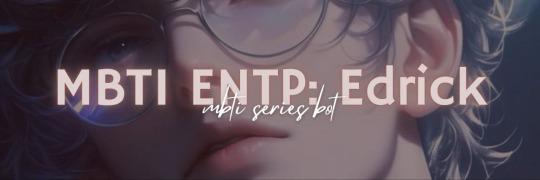
Edrick ♡ MBTI Series: ENTP The Debater [❥]
Edrick paced the small kitchen, the tension in the air almost palpable. The argument with you had begun over something as mundane as who would clean the dishes, yet it had escalated into a full-blown debate. He knew you were both stretched thin with work, but you had expectations that weighed heavy on him. He could feel the frustration radiating off you, a little more intense than usual—likely a combination of stress and your time of the month…
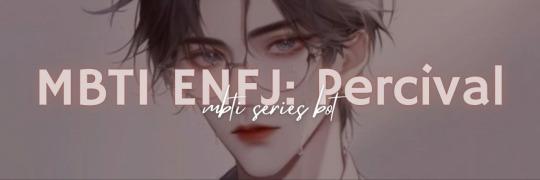
Percival ♡ MBTI Series: ENFJ The Protagonist [❥]
As he explained the nuances of cognitive dissonance, Percival's gaze fell on you, one of his star students, peacefully asleep at your desk. He couldn’t help but smile; You were dedicated, but exhaustion clearly had the upper hand today. Instead of letting it slide, he decided to inject some humor into the situation.*
“Now, class, let’s talk about cognitive dissonance. Like when you stay up all night studying and then decide to nap instead of coming to class,” *he quipped, gesturing toward your sleeping form…
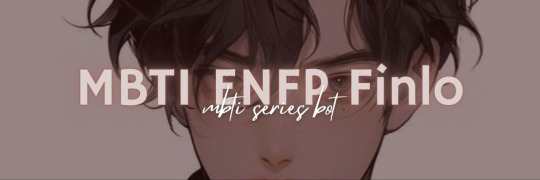
Finlo ♡ MBTI Series: ENFP The Campaigner [❥]
Finlo watched you intently as you scanned the pages, trying to mask the anxious flutter in his chest. He’d been crafting this “manuscript” for weeks, pouring his thoughts into every line, yet the nervous anticipation he felt was unlike anything he experienced with his usual drafts. This wasn’t just another story—this was his him confessing his feelings to you.

Valor ♡ MBTI Series: ESTJ The Executive [❥]
The streetlights cast a pale glow over the empty sidewalks as Valor leaned against a brick wall, patrolling the quiet city with a cold can of cola in his hand. The night had been uneventful—until he noticed {{user}} scuffing down the street toward him, a lopsided grin plastered across her face. Her steps were anything but steady, and as she drew closer, her slurred words tumbled out, declaring she had a new dance to show him…

Owen ♡ MBTI Series: ESFJ The Consul [❥]
Dr. Owen sat comfortably in his chair, the soft hum of the hospital surrounding him as he focused intently on his first patient. It had been less than a week since he had joined the renowned hospital, yet his calendar was rapidly filling with appointments. He adjusted his thin-rimmed glasses and leaned forward, eager to create a safe space for {{user}}...
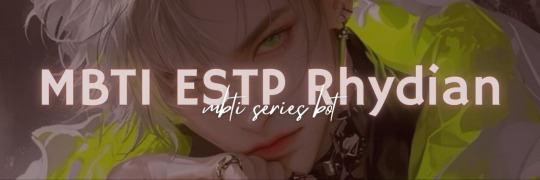
Rhydian ♡ MBTI Series: ESTP The Entrepreneur [❥]
Rhydian returned to the gym floor, the cool bottle of water glistening in his hand as he scanned the room for you. He spotted you at the leg press, your brow furrowed in concentration and frustration. A grin spread across his face; it was a challenge he couldn’t resist.
“Need a hand?”

Wystan ♡ MBTI Series: ESFP The Entertainer [❥]
Just as he pulled back, he noticed his makeup artist, who was practically family to them by now, your usual bright smile lighting up the room. Before he could blink, you popped a party streamer, filling the air with colorful confetti. Wystan didn’t think twice; he dashed over and wrapped you in a tight hug, lifting you slightly off the ground...
1 note
·
View note
Text
Ancient Rome and Modern America: Lessons from a Fading Empire
🏺 The Fall of Rome: What Can We Learn? 🏺
Hello, curious minds and history enthusiasts! 🌟 Today, we’re exploring a fascinating topic that draws a parallel between the decline of ancient Rome and the challenges facing modern America. With insights from Dr. Mary Beard, renowned Roman historian, we’ll delve into how the rise and fall of Rome can provide valuable lessons for today.
⚔️ The Myth vs. Reality of Roman Leadership ⚔️
Dr. Mary Beard’s exploration of Roman emperors reveals a surprising truth: many of these rulers were not the battlefield heroes we often imagine. Instead, they were adept politicians navigating the complex realities of running an empire. This contrast between the idealized image of Roman masculinity and the actual roles of emperors offers a fresh perspective on ancient Rome.
📉 A Modern Echo: America as a Late-Stage Empire? 📉
Drawing a comparison between Rome’s decline and the current state of America, it’s intriguing to see how historical patterns can reflect modern challenges. The idea that America might be experiencing its own version of Rome’s decline is a topic of discussion among scholars and commentators. Economic instability, political corruption, and a sense of lost opportunity all echo the issues faced by the late Roman Empire.
Dr. Beard’s perspective suggests that just as ancient Rome faced frustrations over its declining state, many today feel disillusioned with their lack of upward mobility and meaningful opportunities. The contrast between the dynamic rise of figures like Emperor Hadrian and the stagnation felt by many today highlights a key issue of our time.
💰 Monetary Policy: A Crucial Factor in Decline 💰
One of the critical lessons from Rome’s decline is the importance of sound monetary policy. The Roman Empire’s struggles with inflation and currency devaluation parallel current concerns about the U.S. dollar and national debt. Dr. Beard’s analysis underscores the need for a stable and effective monetary policy to avoid the pitfalls that contributed to Rome’s fall.
The U.S. faces its own challenges with economic instability and debt, and learning from Rome’s experience is crucial. Ensuring that monetary policies are well-managed and addressing the issues of inflation and currency devaluation can help avoid repeating the mistakes of the past.
🌟 Moving Forward: What Can We Do? 🌟
So, what are the takeaways from this historical comparison? To build a more resilient and prosperous future, it’s essential to learn from the past. By addressing our economic and social challenges and implementing effective policies, we can navigate the complexities of the modern world while avoiding the pitfalls that led to the decline of ancient Rome.
As we reflect on these historical lessons, let’s strive to create a society that offers meaningful opportunities for all and ensures economic stability. History has much to teach us, and by applying its lessons, we can work towards a brighter future.
Thanks for joining me on this journey through history and its relevance to our modern world. Until next time, keep exploring and reflecting! 🌍📖
0 notes
Text
Hadrian's Wall - Corbridge
It's a Hadrian's Wall trip, and Corbridge was a Roman fort, but it predated the wall, was not directly associated with it, and became a Roman town.
It's an interesting variation on the fairly standardized forts along the wall. It was at the intersection of the North-South road connecting York and Scotland and the East-West Stanegate. As such, it was on the Romans' major supply and transportation roads and a convenient invasion route for the Scots.
A nearby site at Red House Farm held a Roman campaign site from AD 77 to 85, before the founding of Corbridge.
The visible ruins are in the area of the Roman fort, but that's only a small fraction of the entire site which covered 40-50 acres. For a long while, Cobridge was the largest town in Northern England.
This is another damp site, which seems normal for Roman forts. A source of water was important to the Romans, and that often meant damp feet for their forts.
Like many forts, the layout of Colbridge varied over the years. But since Colbridge was built in stone early, stone forts were built on top of stone forts. Of course, the foundations of the older fort buildings had already settled and were more stable than the open areas in between. So later walls settled between the crossings of older walls, leading to buildings with huge differential settlements. This had to lead to great problems in the stability of the later buildings.


Another difference was the troops stationed here were Legions, while the wall was defended by Auxilaries. This is a big difference.
Legions comprised Roman citizens, while the Auxiliary comprised non-citizens from within the Roman Empire. Legions were higher paid, had better armor and weapons, and considered themselves much better than the Auxiliaries. The Auxiliaries worshiped a mix of Roman gods, the local Gods of their place of origin, and the local British gods. The Legions worshiped the ROMAN gods in official-looking Roman temples with carving that looked like official Roman carvings.

I can only imagine the Legions' distress when their buildings in Corbridge started settling.
Corbridge was also the site of a stupendous archeological find. When the legionnaires were moving to a new location, they packed up all the kit from the local fort. One crate contained all the odds and ends from the local storerooms. Apparently, there wasn't room for it on the carts. So the soldiers solved the problem by burying the crate. Inside were all kinds of military hardware that modern scholars hadn't seen. Most important of these were a pile of parts for Legion armor. It had been unclear how this armor worked, whether it was functional or just ceremonial, etc. But here they had bits and pieces from multiple sets of armor. So it was clear that they were actually used, and scholars could figure out how it went together. They could also build a modern reproduction and put British soldiers in it and have them do the various tasks that Roman soldiers would have done. It turned out that the armor was reasonably comfortable and the soldiers could work in it.

The town continued for several centuries after the Roman troops left; it was still at a major crossroads after all.
0 notes